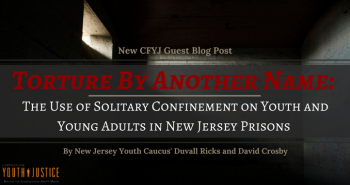Torture By Another Name: The Use of Solitary Confinement on Youth and Young Adults in New Jersey Prisons

By Duvall Ricks and David Crosby, New Jersey Youth Caucus
In 2011, the United Nations Special Rapporteur on Torture deemed the use of solitary confinement against youth and individuals with mental health disabilities as torture. For three years, I saw and experienced firsthand the impact of solitary on youth and young adults in adult jails and prisons. I watched fellow inmates crumble under the conditions of solitary. Some committed suicide. Others experienced severe depression and anger. No one walks out of that experience feeling whole or somehow better than they were going in.
In solitary confinement, I spent 23 hours per day—sometimes 23 ½ hours—in a bare cell, and was allowed to leave for 30 minutes a day to bathe or go outside. Often times, I was denied time outdoors because, as I was told, the prison lacked enough staff to monitor me while the other inmates were on lockdown. Alone in my room, surrounded by stark walls and a tiny window above my line of vision, I had access only to a list of approved books that were heavily censored and kept the knowledge and wisdom of the outside world out of my reach.
Denying individuals any and all access to resources meant to preserve their mental and physical health during incarceration is not rehabilitative, and holding youth, many of whom are suffering from mental illness, in solitary for months and years at a time, is beyond punitive; it is torture. Making a mistake does not justify stripping young people of their humanity. As humans, we need social interaction; we need care; we need touch; we need love. As young people, we need mentors who understand the communities we are coming from, as well as teachers and staff who aim to lift us up in a system that has locked us down.
Last month, the New Jersey Parents’ Caucus (NJPC) released its brief entitled, The Solitary Confinement of Youth with Mental Health Disabilities in New Jersey Adult Prisons. With statements and survey responses from young people on their experiences within solitary confinement in adult prison, the brief highlights key issues facing youth held in solitary confinement such as the disproportionate number of youth of color and youth with disabilities held in these conditions for long periods of time. While Black youth are 17% of the youth population in New Jersey, they were 73% of the youth reporting time in solitary confinement in NJPC’s survey.
With this brief, the NJPC calls on the New Jersey legislature to pass a law ending the use of solitary confinement against youth and young adults in New Jersey prisons. Bills like A. 314, which was introduced in January 2018, are a step in the right direction toward ending the systematic torture of solitary confinement against young people.
It is difficult to fully express all of the injustices that thrive in a system that makes young people invisible to the outside, vulnerable to those working on the inside, and voiceless to those in charge of guaranteeing our safety. However, we have the power to change this reality. Every New Jersey resident has the power to join us in calling on our state legislators to support A. 314. June 26th is the International Day in Support of Victims of Torture. In honor of this day and New Jersey’s youth, please contact your state senators and representatives and urge them to stop practices that lead to suffering in order to make way for healing.
Duvall Ricks, 26, is a member of the NJ Youth Caucus and NJPC Youth Advocate. David Crosby, 25, is a member of the NJ Youth Caucus and NJPC Director of Youth Policy. NJPC’s NJ Youth Caucus is comprised of youth and young adults (15-27 years of age), who have current or prior involvement in the justice system and seeks to reform NJ’s juvenile justice system.

